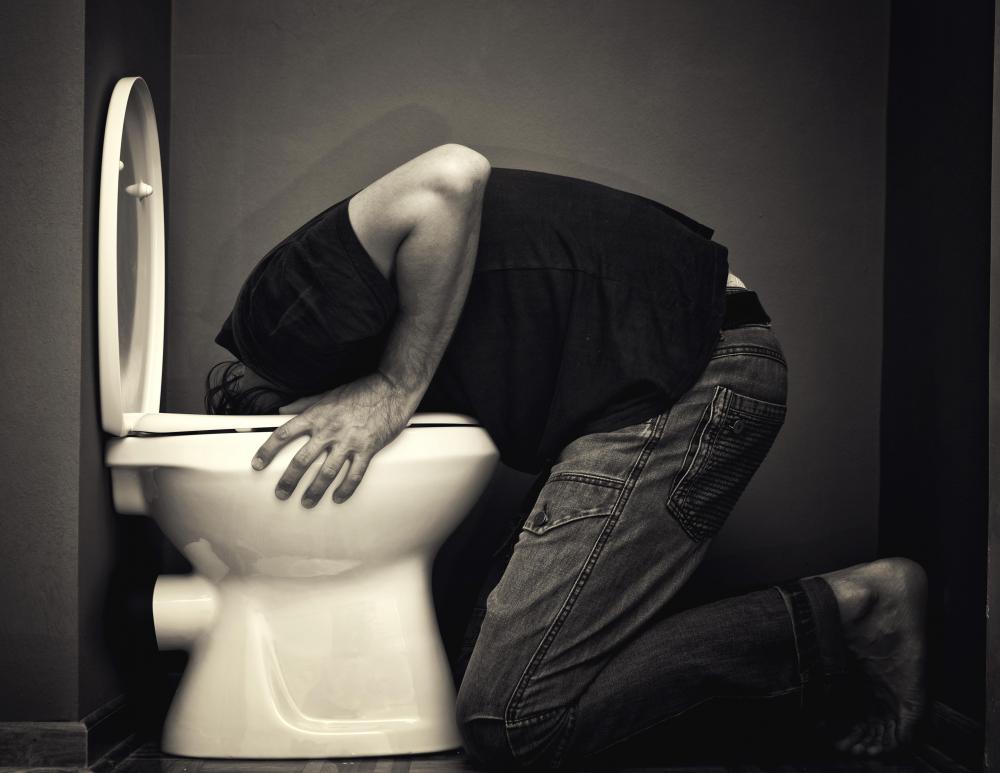At WiseGEEK, we're committed to delivering accurate, trustworthy information. Our expert-authored content is rigorously fact-checked and sourced from credible authorities. Discover how we uphold the highest standards in providing you with reliable knowledge.
What is Overhydration?
Overhydration occurs when an individual drinks too much water. When too much water is consumed, the sodium and other electrolytes that surround the cells can become diluted. This dilution causes water to seep into cells and may lead to the cells swelling. If diluted blood reaches the brain, it could lead to death. Overhydration can be a danger for those participating in various exercises because in an effort to keep themselves hydrated, a person may not realize he is drinking too much water.
In the human body, electrolytes, such as sodium, surround cells and allow for the efficient transfer of bodily communication. Osmotic pressure also maintains fluid balance in cells. When there is too much water in the body, water can migrate into the cells in order to keep osmotic pressure at equilibrium. That extra water can cause the cells to swell. This phenomenon can lead to puffiness of the hands and feet, one of the symptoms of overhydration.

Should diluted blood reach the brain, it could cause brain swelling. The swelling of the brain can lead to a person’s death. Some of the other symptoms of overhydration are confusion, dizziness, vomiting, nausea, and reduced digestion. A person may also gain weight because of the extra water he is carrying. Increased clear urination may also be a sign of a person ingesting too much water.

While it might seem to make sense that ingesting a sports drink containing electrolytes helps stave off overhydration, such drinks do not usually have the same concentration of electrolytes as the body. Drinking such drinks, therefore, may not replace the necessary sodium that the body needs to function. Instead, the water content in these drinks can aid overhydration. If a person becomes overhydrated, the person should stop drinking altogether so the body can eliminate excess water.

An athlete in a marathon may not feel as if he needs to urinate because the stress of running for long periods can promote the secretion of anti-diuretic hormones. If a person is running at the time of overhydration, the runner should stop and allow the hormones to reduce so he can urinate. Should the excess liquid accompany low sodium, a dose of sodium can help to reduce the swelling and aid the body in ridding itself of excess water. If a person thinks he is experiencing the symptoms of overhydration, especially if he is experiencing confusion, dizziness, or other neurological issues, he should seek medical attention as soon as possible.
AS FEATURED ON:
AS FEATURED ON:

















Discussion Comments
@snickerish - I have read that is exactly how you can overhydrate, in short periods because it is then that you have put so much water in your body in a short period of time that the water can more easily dilute the blood.
A tip from my friend who runs ultra-marathons - he drinks a certain amount of water every five minutes or so. Because he is drinking so often it is not much water, but because it is so often he is also staying hydrated!
@geekish - I think that is a possibility - when I would run long distances I used to not pace my drinking, would wait a while to drink any water, and, of course, would get very thirsty and absolutely chug water and became queasy a few times which I thought was just from running.
Now I wonder if it wasn't from overhydrating... can you overhydrate in a short period of time?
When I played soccer in Mississippi during the summer our coaches were sure to weigh us before and after practice so they knew how much water weight we were losing.
I had never heard of drinking too much water, but now that I look back, our coaches placed such an emphasis on drinking water (and it was the only relief under that sun) that I wonder if some of my teammates who did unfortunately vomit during strenuous activity were maybe overhydrated.
This is often an athletic problem, but it can affect other people too. I was reading about women who drink as much as 6 liters of water a day- that's almost 24 cups- because it became almost an addictive compulsion for them. I don't even know what you would do if you were addicted to water, but just know that even if you're not a marathon runner you might be drinking way too much water, and you should probably talk to a doctor about the right amounts.
I first read about this in a running magazine, since athletes are always so concerned about not having enough water. The article said the effect it had on the brain was almost like drowning. How terrible.
I've read since that this is why athletes need salt as well as water, but that sports drink aren't always the best. I guess that unless you feel the symptoms of dehydration you should assume you're drinking enough.
Post your comments